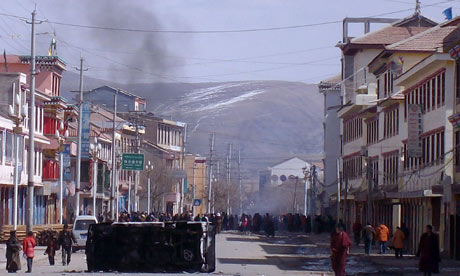China jails Tibetan Buddhist monk for 11 years Monk convicted on charge of intentional homicide for hiding another monk who set himself on fire as a protest

Aba, in the Sichuan province of China, has been the scene of several protests of the past few years against the Chinese government. Photograph: Ho/AFP/Getty Images
A Chinese court has sentenced a Tibetan Buddhist monk to 11 years in jail after ruling that he hid another monk who had set himself on fire, thereby preventing him from receiving emergency treatment.
The official Xinhua news agency said the court in Sichuan province's Aba prefecture imposed the sentence after a one-day trial.
It convicted Drongdru, a monk in the Kirti monastery, on charges of intentional homicide for hiding another monk, Rigzin Phuntsog, for 11 hours after he set himself on fire.
Xinhua said Phuntsog, 16, was a nephew and a disciple of Drongdru and that he died even though he eventually received treatment in a hospital.
The 1death of Phuntsog on 16 March was seen as a protest against China's heavy-handed controls on Tibetan Buddhism and provoked a standoff between security forces and monks.
Aba prefecture has been the scene of numerous protests over the past several years against the Chinese government.
A second trial will be held on Tuesday in which monks Tsering Tenzin and Tenchum will face charges of plotting, instigating, and assisting in the self-immolation.
Kirti monastery is under tight guard by security forces who have been accused by overseas pro-Tibetan groups of beating onlookers and detaining monks. The area is off-limits to foreign journalists.
The circumstances surrounding the monk's death remain unclear. In June, China rejected pressure from a UN human rights panel to provide information about more than 300 monks from Kirti whose whereabouts it said were unknown since the monastery was raided in April.
The foreign ministry said only that monks were undergoing "legal education", a reference to compulsory political lectures on the basics of the Chinese constitution, criminal law and regulations on religious affairs.
Tibetan monks tend to be fiercely loyal to Tibet's exiled Buddhist leader, the Dalai Lama, who is reviled by Beijing. As custodians of Tibet's Buddhist culture, they are especially concerned about tight Chinese controls over monasteries that take time away from religious study and practice.
The official Xinhua news agency said the court in Sichuan province's Aba prefecture imposed the sentence after a one-day trial.
It convicted Drongdru, a monk in the Kirti monastery, on charges of intentional homicide for hiding another monk, Rigzin Phuntsog, for 11 hours after he set himself on fire.
Xinhua said Phuntsog, 16, was a nephew and a disciple of Drongdru and that he died even though he eventually received treatment in a hospital.
The 1death of Phuntsog on 16 March was seen as a protest against China's heavy-handed controls on Tibetan Buddhism and provoked a standoff between security forces and monks.
Aba prefecture has been the scene of numerous protests over the past several years against the Chinese government.
A second trial will be held on Tuesday in which monks Tsering Tenzin and Tenchum will face charges of plotting, instigating, and assisting in the self-immolation.
Kirti monastery is under tight guard by security forces who have been accused by overseas pro-Tibetan groups of beating onlookers and detaining monks. The area is off-limits to foreign journalists.
The circumstances surrounding the monk's death remain unclear. In June, China rejected pressure from a UN human rights panel to provide information about more than 300 monks from Kirti whose whereabouts it said were unknown since the monastery was raided in April.
The foreign ministry said only that monks were undergoing "legal education", a reference to compulsory political lectures on the basics of the Chinese constitution, criminal law and regulations on religious affairs.
Tibetan monks tend to be fiercely loyal to Tibet's exiled Buddhist leader, the Dalai Lama, who is reviled by Beijing. As custodians of Tibet's Buddhist culture, they are especially concerned about tight Chinese controls over monasteries that take time away from religious study and practice.


